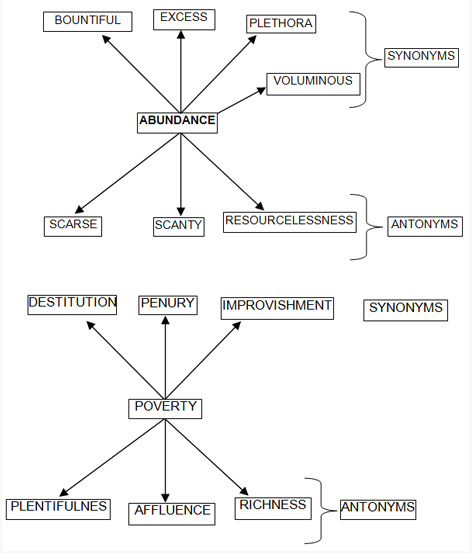Competitive exams feature a lot of questions on vocabulary, especially on synonyms and antonyms. So how do we learn these synonyms and antonyms without being haunted by the huge world of words?
Imagine how monotonous the world would be if there were only a word to describe particular thoughts. If everything is expressed only by a single word in every situation, life would be boring. Luckily, we have synonyms and antonyms to add flavor to our communication skills.
What are Synonyms?
Synonyms are those words that have the same or very similar meaning.
For example:
Weak, Fragile, Flimsy, faint- All mean less energetic
Fast, prompt, quick, hurry -All mean in a fast pace
Rich, wealthy, affluent, well-off –All mean rich class people
The list could go on but important point to consider here is the usage part or contextual meaning. For example, the synonyms for something big are – huge, large, elder etc.
Now, if we have to use it in a sentence where we are talking about a brother, we would write:
Meet my elder brother (It can’t be huge brother or large brother).
Similarly, If we say 'My license has expired'. We can’t say that 'my license is dead', whereas words 'expired' and 'dead' are synonyms and can be replaced with each other in this sentence,‘My grandmother has expired/ My grandmother is dead’.
Here’s how the usage of synonyms play a vital role.
What are Antonyms?
Antonyms are words that have opposite meanings.
For example: Big- Small
Open- Close
True- False (it cannot be ‘wrong’ as it is opposite to ‘right’ though logically it is also correct)
Male-Female (it cannot be ‘woman’ as it will be opposite to the word ‘man’ though logically it is correct )
Again, while using antonyms, always keep in mind the context of the word and then choose the best word that means the opposite.
Correct Usage
When you say, My friend is Mad/Inane/Eccentric, you need to be careful about the context as mad means somebody who is crazy, inane means somebody who is foolish and eccentric means somebody who is strange. So, Context can only make out the real difference.
Every word in the English language has a lot of different meanings. Usually these meaning are categorized into two different categories:
- Primary meaning of the word
- Secondary meaning of the word
Primary meaning of the Word: Occurring first in time or sequence, or not derived from anything else. Hence, similarly meaning of the word is the meaning that is not derived from any other source, and is the basic meaning of the word. Thus the meaning of the word that is given in the dictionary is the primary meaning of the word.
For example: Look at this word - flag
The dictionary meaning of the word flag is - a piece of cloth or similar material, typically oblong or square, attachable by one edge to a pole or rope and used as the symbol or emblem of a country or institution or as a decoration during public festivities.
Secondary meaning of the word:
The meaning that is not specified in the dictionary, instead the meaning has been derived from other sources.
For example: Let us again look at the word flag.
The secondary meaning of the word flag is - to lessen in intensity
Now, let’s discuss some tricks to learn antonyms and synonyms:
TRICK 1:
LOGICAL ASSOCIATION
In logical association, we will logically associate words .
For example: look at the word – speak.

TRICK 2:
CREATE WORD FAMILIES:
In word families, we write the synonyms of the word at one place, and antonyms at the opposite.
For example, let us look at the words - Abundance and Poverty.
The other tricks to learn vocabulary can also be applied to learn antonyms and synonyms.
Vocabulary Preparation Series

